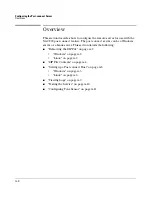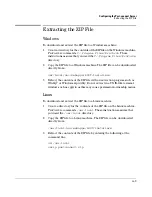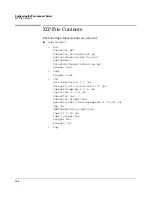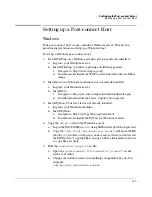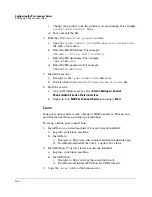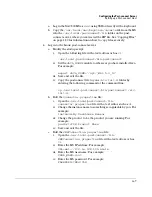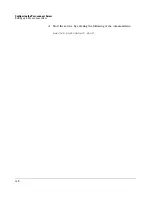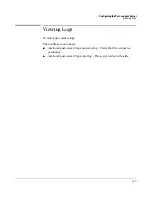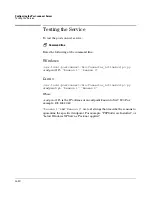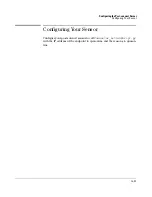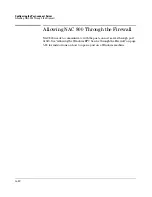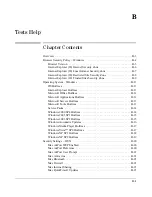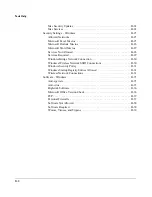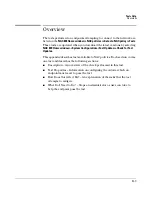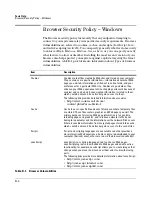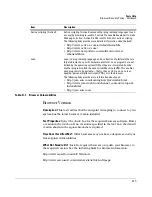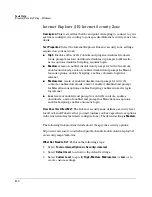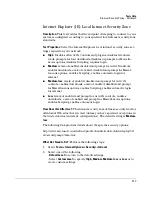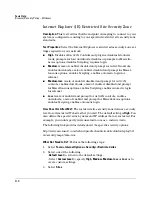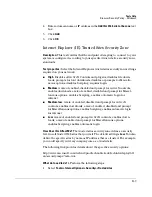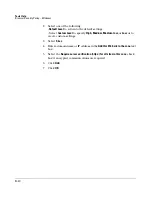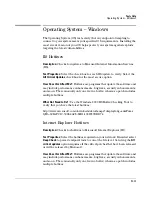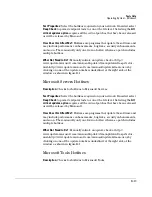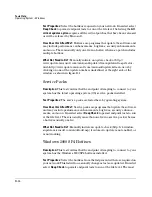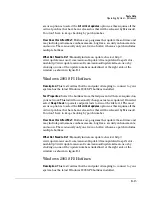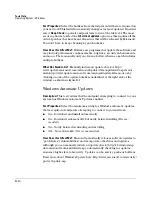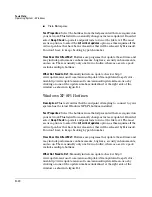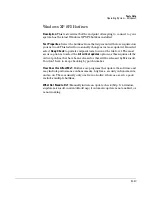
Tests Help
Browser Security Policy – Windows
B-4
Browser Security Policy – Windows
The Browser security policy tests verify that any endpoint attempting to
connect to your system meets your specified security requirements. Browser
vulnerabilities are related to cookies, caches, and scripts (JavaScript, Java,
and Active scripting / ActiveX). You can specify generally what level of security
to enforce (
High
,
Medium
,
Medium-low
, or
Low
) or you can specify exactly
what feature to allow or disallow. Installing the most recent version of your
browser also helps protect your system against exploits targeting the latest
vulnerabilities. table B-1 provides more information about types of browser
vulnerabilities:
Item
Description
Cookies
Cookies are text files created by Web sites and stored on your computer.
They contain user-specific information—information about what Web
pages you visited, information you filled out in online forms, and your
preferences for a particular Web site. Cookies are good when they
enhance your Web experience (online shopping carts work because of
cookies) and can be bad if unencrypted information is stored in them,
which could be misused if an attacker gains access to them.
The following link provides detailed information about cookies:
•
http://www.cookiecentral.com/
content.phtml?area=2&id=1
Cache
Cache is a user-specifiable amount of disk space where temporary files
are stored. These files contain graphics and Web pages you visit. The
primary purposes for storing Web page information is to save time
reloading pages and graphics, and to reduce network traffic by not
having to repeatedly send the information over the network. Risk occurs
if there is sensitive information from encrypted pages stored in the cache,
which could be misused if an attacker gains access to the cache files.
Scripts
Scripts and scripting languages are executable code that provides a
more interactive Web experience. Some scripts are downloaded to your
computer (ActiveX, Java), others are run via the browser (JavaScript).
JavaScript
JavaScript is a scripting language used to enhance Web pages.
JavaScript programs are embedded in Web pages and enable active
functionality; for example, JavaScript allows you to create images that
change when you move the mouse over them and clocks with moving
parts.
The following links provide more detailed information about JavaScript:
•
http://www.javascript.com/
•
http://javascript.internet.com/
•
http://www.javascriptkit.com/
Table B-1.
Browser Vulnerabilities
Summary of Contents for ProCurve NAC 800
Page 1: ...HP ProCurve Network Access Controller 800 Users Guide ...
Page 2: ......
Page 3: ...ProCurve Network Access Controller 800 Release 1 1 Users Guide ...
Page 43: ...2 1 2 Clusters and Servers Chapter Contents Overview 2 2 Installation Examples 2 3 ...
Page 71: ...System Configuration Management Server 3 23 Figure 3 9 System Configuration Management Server ...
Page 80: ...System Configuration User Accounts 3 32 Figure 3 12 System Configuration User Accounts ...
Page 88: ...System Configuration User Roles 3 40 Figure 3 16 System Configuration User Roles ...
Page 180: ... This page intentionally left blank ...
Page 208: ... This page intentionally left blank ...
Page 234: ...End user Access Mac OS X Endpoint Settings 5 26 Figure 5 14 Mac System Preferences ...
Page 288: ... This page intentionally left blank ...
Page 302: ... This page intentionally left blank ...
Page 306: ...High Availability and Load Balancing High Availability 8 4 Figure 8 2 DHCP Installation ...
Page 307: ...High Availability and Load Balancing High Availability 8 5 Figure 8 3 802 1X Installation ...
Page 309: ...9 1 9 Inline Quarantine Method Chapter Contents Inline 9 2 ...
Page 312: ... This page intentionally left blank ...
Page 315: ...DHCP Quarantine Method Overview 10 3 Figure 10 1 DHCP Installation ...
Page 318: ... This page intentionally left blank ...
Page 323: ...802 1X Quarantine Method NAC 800 and 802 1X 11 5 Figure 11 2 NAC 800 802 1X Enforcement ...
Page 324: ...802 1X Quarantine Method NAC 800 and 802 1X 11 6 Figure 11 3 802 1X Communications ...
Page 380: ... This page intentionally left blank ...
Page 418: ... This page intentionally left blank ...
Page 425: ...Reports Viewing Report Details 14 7 Figure 14 3 Test Details Report ...
Page 459: ...System Administration Creating and Replacing SSL Certificates 15 31 10 Save and exit the file ...
Page 468: ... This page intentionally left blank ...
Page 480: ... This page intentionally left blank ...
Page 526: ...Tests Help Security Settings Windows B 34 http www pcworld com article id 112138 article html ...
Page 532: ... This page intentionally left blank ...
Page 562: ... This page intentionally left blank ...

